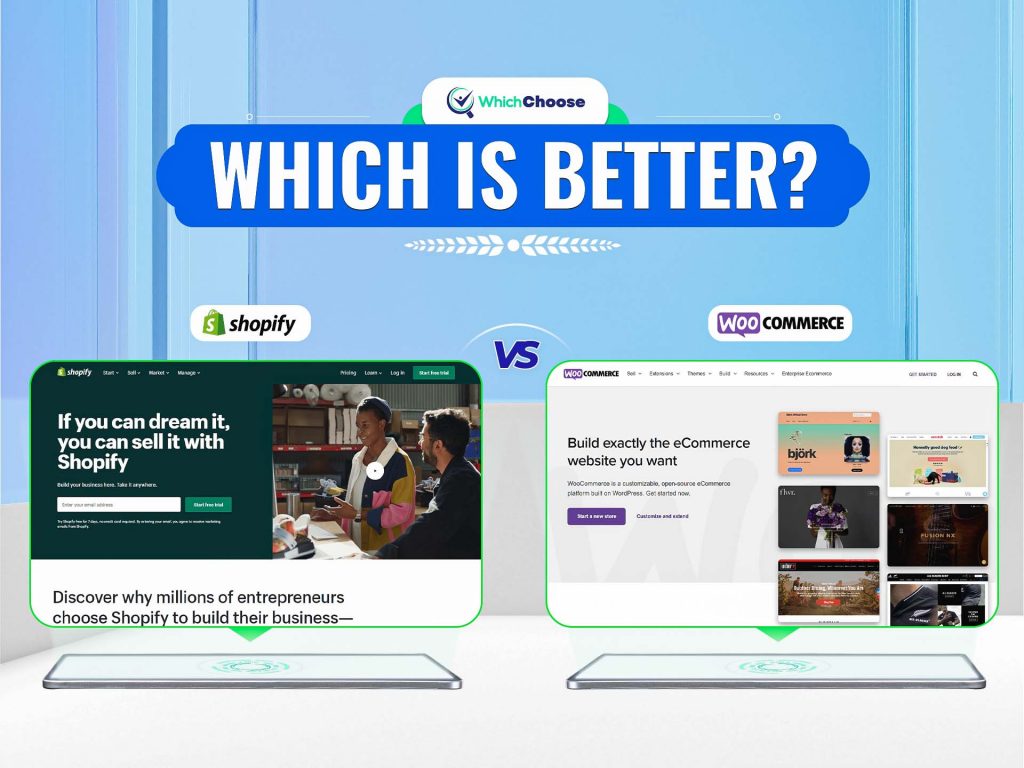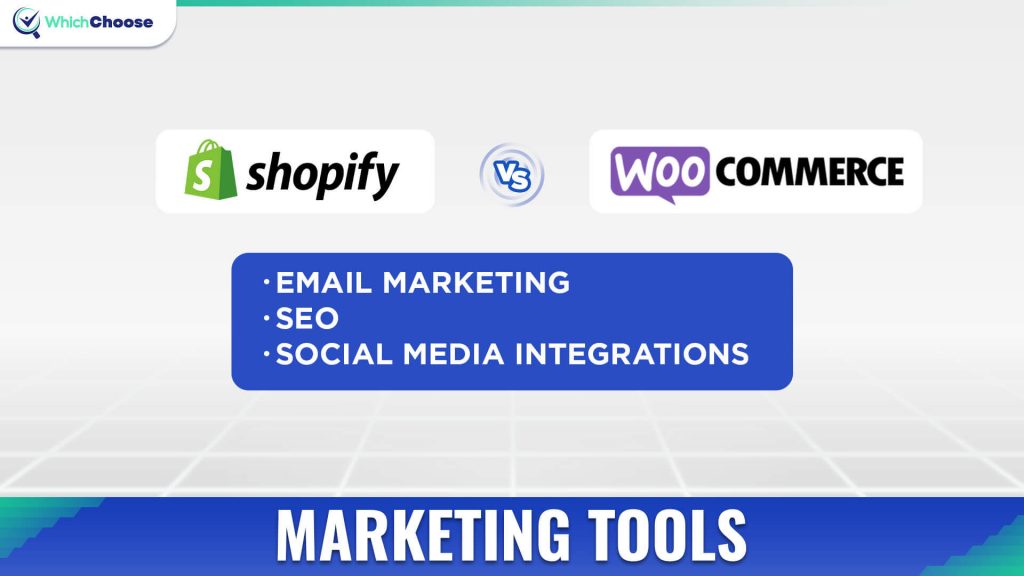Table of Contents
This post contains affiliate links. We earn an affiliate commission when you click our links to purchase products. It has no added cost to you.
Both platforms are robust tools to level up your online store management. However, choosing between Shopify vs WooCommerce might come with difficulties because they show unique benefits and available features. Thus, WhichChoose has done thorough research about these platforms to find out which one is better in general. We also recommend using one over another in specific situations.

Shopify Vs WooCommerce: Overview
Optimized for selling online
Covered by long-term support
Mobile-friendly themes
New updates with trendy features
Built-in apps for digital marketing efforts
It takes care of all web-related issues.
Integrated with WordPress to work
Comes in a free plugin
Strong SEO functions
Wide variety of templates
30-day refund guarantee
1.1. Shopify
Shopify is a one-stop eCommerce platform that requires no technical skills to set up your online storefront. It helps business of all sizes reach their dreams of becoming online sellers for either digital or physical products. Getting started with Shopify is easy, beginning with a free trial and then a paid plan based on your needs.
To give more background about Shopify, this tool is one of the biggest names in the eCommerce software market. Large to small online businesses in the U.S. have certainly heard of it and used it. That’s because the brand takes up 23% of this country’s market share.
1.2. WooCommerce
WooCommerce is more like an open-source eCommerce tool that works on WordPress. The best thing about this platform is that it’s a free plugin itself.
However, that does not mean setting up WooCommerce comes with no costs. Why? Because you need to spend money on domain and hosting to own a WordPress website, which is the first step of building an online store based on WooCommerce.
Since more and more people use WordPress and lean towards publishing helpful content aligned with what they sell, WooCommerce is on a fast development pace. Despite indicating a considerable decrease in the market share from 2020 to 2021, this software takes up around 23% at the moment, which is equal to Shopify.
However, that percentage is just a minor factor in deciding which eCommerce platform works best for you. Let’s head to the sections below for more insights into the Shopify vs WooCommerce comparison.
Shopify Vs WooCommerce: Pros And Cons
First, you might want a quick picture of this comparison based on the pros and cons of WooCommerce and Shopify. We have listed them out in this table:
Simple, easy-to-navigate interface
Fastest loading time
Automatic software updates
Doesn’t require technical skills from users
14-day free trial
Less customizability
Allows customizable SEO functions
The WooCommerce plugin is free
Relies on third-party apps
High frequency of updates
Slow web page loading
Shopify Vs WooCommerce: Page Speed

3.1 Shopify
The average loading time for Shopify’s web pages is 309 milliseconds, which is ideal for user experience. Also, Google recommends that websites just load in 500 milliseconds or lower. Whatever loading time above this figure may result in lousy SEO and a low-quality user experience in the eyes of Google.
3.2 WooCommerce
Based on our research, WooCommerce’s page loading time is relatively low. The average response time of the homepage is 1 second, while that of the check-out page is 1.32 seconds! Thus, Shopify delivers a better overall user experience than WooCommerce.
However, note that the loading page speed depends on HTML codes and your website’s hosting plan. For the web pages’ response time to be fast, you should opt for premium hosting services or not-so-cheap ones. Additionally, if you’re not familiar with HTLM codes as well as other website technical issues, using WooCommerce can be a challenge.
Shopify Vs WooCommerce: Ease of Use
4.1 Shopify
Because Shopify is a hosted eCommerce platform, it covers all the technical aspects of running an online store. You don’t have to take care of the domain, hosting, SSL certificate, and UX/UI, just to mention a few.
It’s literally built for noob store owners to grow their businesses in the 4.0 era on an easy-to-navigate interface. Thanks to that, you save tons of money on hiring professional website developers/coders as well as time to focus on your sales.
In a nutshell, with mere common sense, users will grasp all of Shopify’s features quickly in first use. We recommend Shopify to anyone who wants 100% technical support from their chosen eCommerce platform.
4.2 WooCommerce
If you are unfamiliar with building a store website from scratch, you will find WooCommerce challenging to start with and manage later. Unlike Shopify, this online store builder comes with no technical support itself.
Accordingly, you must source your web hosting, run a domain and ensure the web codes are well-structured. However, because it requires WordPress to be able to work, it’s easier for SEO and other digital marketing setups.
Shopify Vs WooCommerce: Design and Themes
5.1 Shopify
Shopify is currently offering 73 template options, nine of which are free. Each template or theme comes with variations, which means there are technically over 100 different designs to use. Also, Shopify themes cover nearly all industries to make sure as much as people can find the platform useful.
UX/UI experts appreciate Shopify’s themes because they are most elegant and well-organized on desktop and mobile interfaces. Additionally, all these are crafted by talented website designers. Still, Shopify allows users to customize their chosen themes using the theme editor and the Liquid code.
5.2 WooCommerce
WooCommerce offers 56 themes, 14 of which are free! The themes vary from different topics such as Arts & Crafts, Digital & Audio, Electronics & Software, Food & Drink, Health & Beauty, etc. Besides, they are all mobile-friendly with a 30-day money-back guarantee.
WooCommerce Vs Shopify: Marketing Tools
| Marketing tools | Shopify | WooCommerce |
| Email Marketing |
|
Third-party email marketing services (Sendinblue, Omnisend, Seguno, etc.) |
| SEO |
|
|
| Social Media Integrations | Multichannel selling with platforms such as Facebook, Pinterest, eBay, and Amazon. | Multichannel selling with platforms such as Instagram, eBay, and Amazon. |
In terms of marketing integration, both Shopify and WooCommerce allow you to do whatever is needed. However, each has different features that make it surpass the other.
While Shopify provides users with built-in apps to help with email marketing, with WooCommerce, you must buy a third-party email marketing tool. However, SEO enthusiasts will prefer WooCommerce because they have the complete freedom to apply their SEO tactics to their store websites.

Shopify Vs WooCommerce: Pricing and Payment Methods
While Shopify comes at a price itself, WooCommerce doesn’t. However, to use WooCommerce, you must build a website which can cost you dollars per month. Here’s an overview of the pricing as well as payment methods of both eCommerce platforms.
| Shopify | WooCommerce | |
| Pricing | From $29 to $99 based on subscription plans plus a 14-day free trial | Free (However, website building comes at a cost depending on what hosting service you use) |
| Payment methods | The owner’s bank account | 80 payment gateways |
As a summary to this comparison, Shopify vs WooCommerce — which is better? To be honest, it depends on how you want to run your online shop. For store owners who want to make a quick online presence of their storefront with easy-to-adapt features, Shopify is the best. Meanwhile, people who want to go deeper in SEO and other web-related aspects will find WooCommerce helpful.
Whatever you want to go with, bear in mind that both options have substantial potential to push your products toward the target audience. And both come at a cost to work. Because of the rapid growth of online shopping, however, you don’t want to be slow at putting your products on shelves while reaching prospective customers. Therefore, WhichChoose believes in Shopify as the best solution for making your online shop quickly approachable without fear of complicated or corny web management. We hope you find this Shopify vs WooCommerce comparison helpful.
WhichChoose is the website products and services review that helps users in the world to find what the best is and shop easily.








